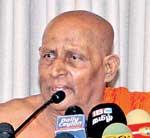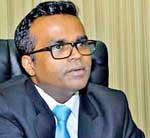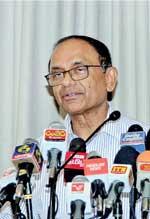Reply To:
Name - Reply Comment
Last Updated : 2024-04-19 22:36:00

Panellists of the Civil Society and Trade Union Collective.
Pic by Nimalsiri Edirisinghe
 Another Presidential term is drawing to a close. Another President is reflecting on his years of serving as the leader of the country and wondering – How will the citizens remember me? For President Sirisena, this is a rather vexing exercise for two reasons – firstly, it is because the former president Mahinda Rajapaksa was a tough act to follow, and secondly, it is because of the many things that went wrong than right during his presidential term. He would then wonder – What can I do to make the citizens remember me? This is where the public debate and controversy surrounding the enforcement of the death penalty comes to light. The President has now managed to stir public opinion and attract public attention to him when he announced his intention to hand the convicted drug offenders who have been convicted to death and remain in the Welikada prison. One cannot help but wonder why the President chose such a controversial affair as his saving grace, nevertheless, now that different views about the death penalty are being formed in society, it warrants due consideration.
Another Presidential term is drawing to a close. Another President is reflecting on his years of serving as the leader of the country and wondering – How will the citizens remember me? For President Sirisena, this is a rather vexing exercise for two reasons – firstly, it is because the former president Mahinda Rajapaksa was a tough act to follow, and secondly, it is because of the many things that went wrong than right during his presidential term. He would then wonder – What can I do to make the citizens remember me? This is where the public debate and controversy surrounding the enforcement of the death penalty comes to light. The President has now managed to stir public opinion and attract public attention to him when he announced his intention to hand the convicted drug offenders who have been convicted to death and remain in the Welikada prison. One cannot help but wonder why the President chose such a controversial affair as his saving grace, nevertheless, now that different views about the death penalty are being formed in society, it warrants due consideration.
Controversies surrounding death penalty
 The Death Penalty, also known as capital punishment is considered to be the highest punishment imposed by the State to criminals who have committed the gravest of crimes such as mass murder, terrorism, treason, drug trafficking and drug dealing. It is a subject that is disputed and debated upon across the world and positions held by people vary based on their political ideology, culture and religion. Despite the retention the death penalty as a State-executed punishment in many countries, human rights activists consider it inhumane and criticize its irreversibility. It is also argued to be encouraging a culture of violence and lacking any deterrent effect.
The Death Penalty, also known as capital punishment is considered to be the highest punishment imposed by the State to criminals who have committed the gravest of crimes such as mass murder, terrorism, treason, drug trafficking and drug dealing. It is a subject that is disputed and debated upon across the world and positions held by people vary based on their political ideology, culture and religion. Despite the retention the death penalty as a State-executed punishment in many countries, human rights activists consider it inhumane and criticize its irreversibility. It is also argued to be encouraging a culture of violence and lacking any deterrent effect.
Growing intl. consensus on abolishing death penalty
In 1971, the United Nations General Assembly passed a resolution which asserted that in order fully to guarantee the right to life provided for under the Universal Declaration of Human Rights, the number of offenses for which the death penalty could be imposed, with a view toward abolishing it altogether. Under the ICCPR’s second optional protocol, State Parties have undertaken to not carry out executions. The Council of Europe and the European Union have established as a condition of membership in their organizations that prospective member countries suspend executions and commit themselves to abolition of the death penalty. Many African countries have abolished capital punishment. In South Africa which formerly had one of the world’s highest execution rates, the Constitutional Court in a landmark case outlawed death penalty by declaring that it amounts to torture, inhuman and degrading treatment and punishment and thereby violative of inherent dignity and human rights of individuals.
No positive relationship between death penalty, decrease in crime
There is empirical evidence available through many researches carried out by sociologists across the world that capital punishment does not lead to a decrease in the crime rate – in other words, it does not act as a deterrent to crime. According to the Amnesty International, a study of criminologists conducted by the National Research Council in the USA in 2009 revealed that over 88% believed that death penalty was not a deterrent to murder and that the murder rate in non-death penalty states has remained consistently lower than the rates with the death penalty.
Death penalty in SL’s current landscape
In the wake of the talk of executing drug offenders, Sri Lankan civil society has pro-actively taken it up upon themselves to counter and denounce the real or fazllacious trend to support the President’s move. Among them is the Civil Society and Trade Union Collective, which gathered the public last month, joining in a panel to discuss whether the death penalty is necessary or not.

The President is attempting to regain fame by having a couple of drug addicts killed.
– Saman Ratnapriya
Speaking on behalf of the organization, its Convener, Saman Ratnapriya opined that the President is attempting to form public opinion about the death sentence without a providing an analytical explanation to it. He considered the recent poll conducted by the President at an exhibition in Anuradhapura, the result of which was that more than 90% of the gathering was in favour of enforcing the death penalty was an example of President’s attempt to implant an opinion within the community about the death penalty.
“The reason for the move to execute drug offenders is the elimination of the crime of drug dealing and trafficking. How President justifies this is by observing that when drug offenders are put to prison, they continue to engage in the same business and therefore executing them is the only solution. It is alarming how the President does not see the irony in his very words. If the drug menace is prevalent in prisons, then the solution is to undertake prison reforms and make institutional changes. The President is attempting to regain fame by having a couple of drug addicts killed.”
Mr. Ratnapriya spoke of the growing trend of countries including those where crimes and human rights violations persist at a much more aggravated level like Rwanda have abolished the death penalty. He drew parallels between Sri Lanka and Nepal based on the Buddhist cultural heritage and pointed out how, in Nepal, based on Buddhist principles alone capital punishment has been done away with.
He also spoke of the finality of the death penalty and the inherent risk of taking the life of someone who is not guilty. He referred to a study done in the UK where it was revealed that during the period from 1998 to 2007, 280 decisions made by courts were not a result of accurate dispensation of justice as a result of drawbacks on the criminal justice procedure.

This is only an act put up by President. I am positive he will not implement it
– Ven. Mahadankadawala Punyasara Thera
Ven. Punyasara Thera assured that the public need not be worried or influenced by what the President says.
“The movement to eradicate the dug menace from the country undertaken by the President involved a lot of people and money. If the drug business happens inside prisons, then prisons must be reformed. If drugs are being brought to the country in ships, then security must be tightened. My opinion is that this is only an act put up by the President. I am positive that he will not implement the death penalty. He has failed to deliver all that he promised when he was elected in January 2015, doing injustice to all religious and ethnic communities who are citizens of the country.”
The prelate further stated that although the USA may have made the death penalty operative again, we cannot consider USA as an example in this because they don’t have Buddhist principles inculcated in their culture like Sri Lanka.

President must not circumvent legislative procedure again and impose the death penalty
– Karunarathna Paranawithana Dy Minister of Skills Dev. and Vocational Training,
MP Karunarathna Paranawithana stated that he will always protest the implementation of the death penalty. He admitted that the debate on the death penalty is an ongoing one involving arguments for and against from sociological, human rights, legal and statistical perspectives. However, the tendency of the word has been to abolish the death penalty or suspend its operation taking into account its irreversibility as a punishment.
The Minister claimed that he will fully support the President’s programme to eliminate the drug menace from the country, but choosing four convicted criminals out of the many and hanging them is not the solution.
“If the President himself admits that the drug business takes place inside the prisons, and even prison officers are involved, then the President is very wrong in deciding that execution of a few convicts is the solution. The President must not circumvent legislative procedure again and impose the death penalty - we all saw the last time the law was overlooked by the President. Although we have not ratified the second Optional Protocol to the ICCPR, we were moving towards that direction and we must not take a step back now”.

There is no point in harping on the final step of criminal justice process without addressing drawbacks of the steps that precede it
– Dr. Jayampathi Wickramaratne, PC
Member of Parliament, Dr. Jayampathi Wickramaratne, PC. drew from literature and jurisprudence across the world, throwing light upon the undesirability of the death penalty and its failure to be a deterrent to crime He cited the case of State vs Makwanyane wherein the Constitutional Court of South Africa held that the greatest deterrent to a crime is the likelihood that offenders will be apprehended, convicted and punished and it is at this level and through addressing the causes of crime that the State must seek to combat lawlessness. Dr. Wickremaratne stated in agreement with this judgment that people who plan murders don’t sit around and second guess their intention contemplating the risk of being executed if convicted. Therefore, the death penalty has no deterrent effect on reducing crimes.
Addressing the human rights dimension, Dr. Wickramaratne referred to a famous statement made by Colvin R. de Silva – “Of all things the State may take away from man, there is one thing that it cannot take away and that is a man’s right to life. He also cited US Supreme Court Judge Marshall who opined that the death penalty is so barbaric and it is in all circumstances, a cruel and unusual punishment. Mirroring the thoughts expressed by the other panelists, Dr. Wickramaratne also insisted that the solution lies in addressing the drawbacks of the criminal justice system which involves many steps like investigation, prosecution and trials.
Inoperative death penalty and the Rule of Law
Responding to the Dailymirror ,Prashantha Lal de Alwis, PC took the interesting view that having the death sentence and not imposing it is a violation of the Rule of Law. He stated that according to the written laws, the death penalty is provided for, and therefore not implementing it is a mockery and hypocrisy.
“As a young State Counsel, the experience of sentencing a man to death was haunting and tormenting to me. There are people crying, the lights are dimmed and the pen used to write the sentence is broken into two. However, it all becomes an anomaly and mockery because the sentence is carried out and instead the convicts are put in prison for life.”
Mr. de Alwis also spoke on the death row phenomenon recalling the incident where the several prisoners of the Welikada prison got on to the roof demanding the implementation of the death penalty than being imprisoned for life.
The bill was presented by the UNP MP Bandarigoda countering the President’s move to remove the suspension on the death penalty. According to the Bill, reference to any Act to the imposition of the death penalty shall be construed as punishment by imprisonment for life
He opined that the death sentence was against his spiritual beliefs. However, he mentioned that he has a feeling that if the criminal justice procedure is carried out as it should be, the death penalty may be a deterrent for organized crimes, but he was strictly against selectively executing a few drug offenders, which will have no deterrent effect on wiping out the crime.
Is the Private Member Bill to abolish the death penalty illegal?
President at an event held in Divulapitiya recently stated that presenting a bill to abolish death penalty is a victory and cause for celebration for drug smugglers, criminals and rapists in Sri Lanka. He further stated that a private member bill presented to Parliament to abolish the death penalty by a member of the Government Party is illegal according to the Attorney General. President requested citizens to support his decision to enforce the death penalty as it has been taken with a view to protecting the future generations from the drug menace.
The private member bill was presented by the UNP MP Bandula Lal Bandarigoda recently countering the President’s move to remove the suspension on the death penalty. According to the Bill, reference to any Act to the imposition of the death penalty shall be construed as punishment by imprisonment for life.
Although attempts were made to obtain opinions from several constitutional experts, efforts were unsuccessful as the grounds for claiming that the Bill was illegal were not revealed by the President.

Add comment
Comments will be edited (grammar, spelling and slang) and authorized at the discretion of Daily Mirror online. The website also has the right not to publish selected comments.
Reply To:
Name - Reply Comment
On March 26, a couple arriving from Thailand was arrested with 88 live animal
According to villagers from Naula-Moragolla out of 105 families 80 can afford
Is the situation in Sri Lanka so grim that locals harbour hope that they coul
A recent post on social media revealed that three purple-faced langurs near t